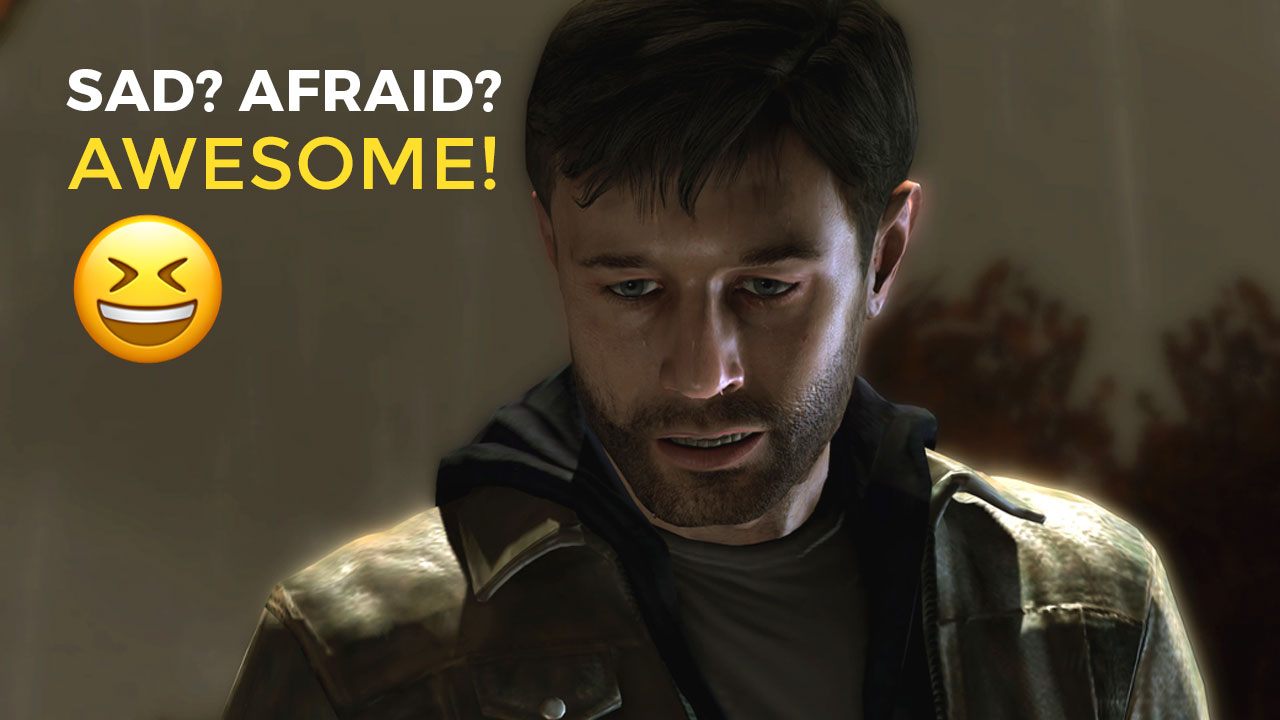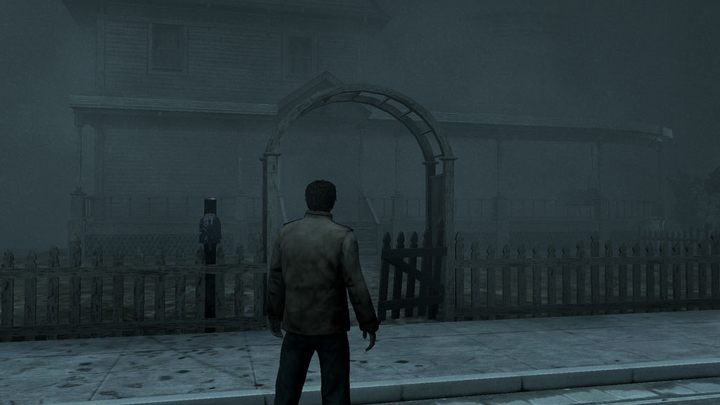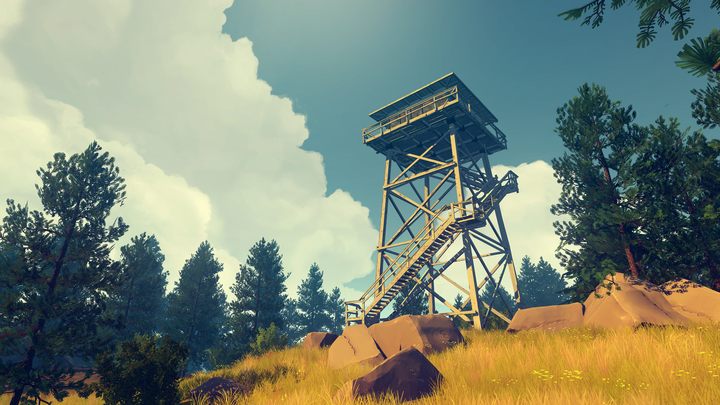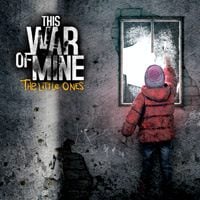Why Do We Enjoy Fear and Violence in Games?
Fear, sadness, anger – games often depict emotions and situations we wouldn't call positive... And still, we are enthralled by those games. Where does that contradiction come from?

The times when games were just simple entertainment are gone forever. Now they are supposed not only to relax, let us meet new people, or get away from everyday life. Games are capable of delivering an incredibly wide array of emotions. But why do we crave them so much when they often depict stuff that’s not pleasant at all?
If I had to name a single, most impressive scene from a game, it would be the lizard trial from Heavy Rain. I found it extremely intense and mentally exhausting. Literally moments after completing it, I came to a conclusion – despite the bleak emotional content, this was one of the best experiences a game has ever delivered for me.

I was thrilled with the emotions this scene evoked in me, even though I certainly wouldn't want to experience them in real life.
Something is better than nothing
The pursuit of, generally speaking, unpleasant feelings – such as anxiety, frustration, tension or confusion – may at first glance seem somewhat contradictory and even nonsensical. Upon closer inspection, however, it turns out there is a lot of sense to it, and it has nothing to do with masochism.
In fact, this propensity of the human mind has been exploited in (pop)culture since time immemorial. Horror films, for example, exist mostly because of it.
The explanation for this phenomenon is actually quite simple – people need thrills. They need them so much that being cut off from any stimuli is considered one of the most horrible tortures. There's more! If the mind is deprived of all stimuli, it will begin to produce them off its own bat after a while – inducing hallucinations.

Culture and art in general, video games included, are a great way for us to obtain stimuli (all kinds of them, too – emotional, intellectual, and even spiritual) and hence escape boredom. Our daily life, compared to that of our ancestors, is rather quiet and even monotonous. Most of us are unlikely to need to run from predators or go on dangerous excursions to get food. And while this is certainly nice, the vision of standing face to face with danger has its own, particular charm and certainly seems appealing to many – "Into the wolf's mouth" goes an Italian saying, meaning as much as "Courage!" However, the lack of this type of experiences can be relatively easily compensated for – by playing a survival horror, for example.
Of course, the most interesting experiences are those that are new, different from those experienced every day. And games, thanks to the variety of mechanics and subjects they address, not only have a huge scope for providing interesting stimuli, but also allow them to be experienced in a safe, fully controlled environment.
Fear is a mind feeder
As I mentioned, horror movies are one of the most obvious examples of pleasure derived from – essentially – unpleasant emotions.
Fear itself is an unquestionably aversive, basic, and primal emotion. It prompts people to run away from what caused it and serves to avoid danger. And yet, when we reach for Silent Hill or Insomnia, there’s something enticing about that fear. We crave that underlying anxiety, a sense of confusion and tension. We want to feel things that we'd normally find completely repulsive.

Video games obviously have the additional quality of putting you at the center of the events with mechanics and camera position. I'll go back to the example from Heavy Rain, where the protagonist's emotions – his reluctance to do what he's supposed to do, his tearfulness, and just plain fear – are accentuated by music, the shaking of the camera, and even gamepad vibration. All these additional elements subtly exacerbate the anxiety, making it much more intense that if we were actually participating in the events.
This claim may seem surprising, but it was actually proven in a study by researchers at the University of Wollongong. It turned out that the respondents felt more fearful when watching violent films than when watching such scenes live – which was probably due to the way the narration was carried out, as well as additional elements, such as music.
The soundtrack in horror films (both movies and games) is actually quite an interesting phenomenon. It was composed in such a way as to have the strongest possible effect on the so-called reptile brain, which is responsible for our basic instincts, including the fight-or-flight response.
Okay, but how specifically does fear work in games and why do we actually enjoy it?
When the human brain first encounters something that causes fear, it cannot distinguish whether the threat is genuine or not – the distinction only comes later. This is because the fear response happens in two different places in the brain – the amygdala and the neocortex.
The amygdala gets absolute priority in interpreting potential threats, which has both advantages and disadvantages. However, this part of the brain cannot determine whether the danger is actual or not. Seeing a murderer with a chainsaw immediately triggers a fear response to motivate coping with the threat, i.e. taking to the heels. Even if it is just a video game character that gets killed. This may seem like a bunch of nonsense, but it isn't in reality. The amygdala is our primary safeguard, and it generally wastes no time figuring out whether a movement you spot in the corner of your eye was a mouse or a rattlesnake – which is great, because you might just get one chance with a rattlesnake.

The neocortex, which is the part of the brain through which we consciously interpret what we perceive, is a little further down the chain. Therefore, we are only able to realize that the danger was not real after the original fear response had already been triggered.
On the one hand, we experience the real emotion of fear in games; on the other hand, we soon become aware of the fictitious nature of that fear, and thus experience anxiety in safe, controlled conditions. We are aware, if only subconsciously, that the game is just a game, and that in the worst case, we can just unplug the hellish contraption from the power outlet.
And this situation turns out to be quite beneficial for us – we can experience an interesting emotion without any of its negative consequences (like being mauled by Mr. Pyramidhead, for example).
Fear, in fact, and contrary to appearances, can produce many positive effects. For example, it prompts the release of adrenaline, and this, for some, at least – especially for young players with a strong drive to new sensations – can be downright addictive. Another fun thing about experiencing such artificially-induced fear is the feeling of relief and pleasure that comes afterwards.
ADRENALINE ADDICTION
Adrenaline, a hormone secreted in situations of stress and danger by adrenaline glands (biological terminology doesn't get any easier than that), can induce a state of very pleasant excitement, even comparable to intoxication. Besides, it motivates the entire body, making us feel energized for a while. Once the threat is gone, the reward system in the brain is stimulated. Therefore, adrenaline can be behaviorally addictive, just like gambling or shopping. The addicted person increasingly seeks constant stimulation and extreme experiences, seeks taking risks and abhors lack thereof.
Do me some harm
Fear, however, is only the most obvious of examples. Depending on the genre or theme of a particular production, we have the opportunity to confront many different feelings. Games often raise difficult issues and put characters in situations we'd rather avoid. And they don't have to be extreme circumstances with a high potential for causing PTSD.

Video games also tackle subjects and emotions that, while unpleasant, are part of our everyday lives. These involve dealing with illness or loss of a loved one, despair, rejection or heartbreak. These are painful feelings, but undoubtedly interesting, valuable and formative. And again – we can experience them safely in the game. After all, the protagonist of Firewatch, whose wife suffers from dementia, is lines of code rather than flesh and bone. And no matter how much we empathize with him, the emotions we experience will be less invasive than those we would feel in real life. Because after all, a game, despite all the emotional charge it carries, is just a game. And this is what allows us to maintain a sense of control and security.
If I have to choose between one evil and the other... that's great.
A particularly interesting category of games that provide not necessarily pleasant experiences are non-linear titles, in which the player, through the likes of our iconic witcher Geralt, must make difficult moral choices.
I don't think many of us would want to face the dilemma of which friend to save and which to sacrifice in real life. But in a game? It’s different. In the game, we can experience these difficult emotions in a controlled environment. We can try different paths, test our own feelings, push boundaries without having to face real negative consequences in the process.
"When you gaze into the abyss, it also gazes at you"
Not only do games provide a great opportunity to experience unpleasant, but nonetheless interesting emotions – they also allow you to learn something about yourself. These types of experiences and choices are thought provoking, and an interesting avenue for introspection (interestingly, positive emotions are much less likely to provoke such reflections). They don't have to be incredibly exalted and answer the big questions about who we are and where we're going, but they can occasion thinking about why we act and feel the way we do. And, above all – what does it tell us about ourself?
If I really found myself in a difficult situation, would I behave the same way as in the game? What kind of person am I if, in This War of Mine, I didn't share food with a couple of old people, so that my characters would have a better chance of surviving?

Of course, we won't always feel like pondering over philosophical issues every evening. Games are meant to be fun and enjoyable, so if someone just wants to shoot enemies and not think about the meaning of life, there's nothing wrong with that. However, I think the very fact that games give us the opportunity to experience so many different feelings and can be a pretext for so many interesting thoughts adds a whole lot of depth to them. And that's awesome.




